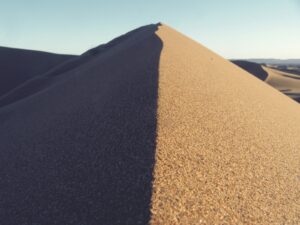Subscribe to the Newsletter
If you are interested in understanding how Traditional Chinese Medicine can improve your life sign up to my newsletter for the latest updates.

Do we really need all these supplements – all this stuff?
Well, you can skip the rest of this page. Here’s your answer:
Still reading? OK! You want more.
First, let’s not forget fashion and marketing.
If everyone is persuaded by my advertisement for Scottish midge enhanced milk juice-
“a highly nutritious organic nutriceutical with the ability to promote a voracious sexual appetite and excellent antioxidant qualities tempered only by a slight deficiency in protein, which can be compensated for by taking milk juice from the South African warthog flea, also available here” |
|---|
– I’ll make a fortune!
Let’s also not forget that some people have:
Any one of these can make a huge difference to whether you need a supplement.
Some people have better genes which enable their bodies to maintain better health even when deprived of the ideal resources.
Some people have happier personalities: they adjust better to life, even deprivation.
Let us not forget, too, that we’ve been systematically plundering the soil for 90 years: in some countries we’ve forced from it sometimes two or even more harvests annually.
If you don’t believe me, read up soil degradation. Hence we give the soil supplements!
How? Often by adding just Potassium, Nitrogen, and Phosphorus. Because these chemicals help plants grow big, they do, fast. But though big, they aren’t necessarily healthy plants.
Plants, like us, need up to 70 minerals. Scientists keep having to revise upwards their estimates of the importance of these micro-nutrients to us.
Putting in three and taking out seventy nutrients long-term leads to neither healthy plants, nor healthy people.
What do food producers do? For sickly plants they have to add all sorts of conditioners, fungicides, pesticides, herbicides and preservatives to prevent illness in the plant and then, after harvesting, keep it safe to eat.
‘Safe’ to eat doesn’t necessarily mean it is nutritious!
The UK Government’s Food Safety Agency looks first at food safety: nutrition is a distant second.
Organic farmers claim that if grown on healthy, mineral and micro-organism rich soil, plants fight off disease more easily.
It remains to be shown that organic food is bad for us long-term, (though that’s basically all our ancestors ate, there being no such thing as intensive farming methods until recently when they discovered the benefits of crop-rotation) or that intensively processed food is good for us long-term. To be fair, however, we can’t prove it’s all bad, either.
Unfortunately, short-term interests usually overcome long-term prudence.
The Chinese didn’t have this problem, at least until very recently when they too began farming intensively.
This is not to say that organic food is always better than non-organic food. Organic food grown on poor soil may be nothing like as good as non-organic food grown on good soil.
If the plants lack those extra nutrients, so shall we! Many preventable diseases arise where we lack an essential nutrient.
Take Selenium. Regarded as unimportant until 35 years ago. Then suddenly heralded as an important preventative for some kinds of cancer. (The Chinese discovered this, when people in certain provinces with a history of high primary liver cancer given selenium greatly reduced the incidence of the disease.) Now known to have a large range of applications as a supplement.
Or manganese, previously rated not just insignificant as a supplement, but highly toxic. Well, it’s both. Too much will kill you. Too little and various essential enzyme processes don’t happen. So now it turns out we need it.
Probably we need virtually everything in the periodic table in some quantity, even poisons.

To get big, if you read what heavy-weight body-builders eat, you’d think you need to kill an ox every day. Obviously body-builders need more protein to replace the damaged tissue caused by intensive work-outs, but most people can’t actually absorb more than 30 grams or so of protein at a time.
So eating ten eggs for breakfast when eggs contain between 4 and 6 grams of protein each, comfortably takes you over the limit your body can absorb at that meal.
Of course you may argue that you don’t absorb all the protein available but still, many people overload their digestions by eating too much, eventually weakening what in Chinese medicine is called their Spleen Qi.
What happens then is that they start to get phlegm, runny bowel movements and lowered spirits. Then they get fat.
If you suffer from a damp, cold condition – for example, some kinds of muscular pain are classified as being of damp, cold origin, (for more on Damp conditions, click here) – then you would be unwise to eat foods that have a cold and damp nature, because they may exacerbate your condition. Click here to read about Cold Foods, for instance.
For more on nutrition, click here.
Fortunately, this energetic effect in food is often mild, at least compared to herbs, and certainly as compared to drug medication.
We would need to eat a particular food intensively and exclusively to discover its effect. Few people do this, so food is generally safe (if you are considering foods from organic sources, untouched by chemicals).
But a few people, some otherwise supposedly sane, do over-eat particular foods!
I remember asking the Dean of the Faculty of Medicine at Edinburgh University how much time was spent teaching nutrition to the medical students during the five to seven years of their training.
After some thought, he admitted to just a couple of hours, mainly to cover the effects of food poisoning such as when someone eats nothing but, say, carrots.
At the time I was horrified by how qualified doctors could emerge from that prestigious medical faculty knowing nothing of the importance of food for health.
But of course, occasionally people do eat nothing but carrots, making themselves ill, and doctors need to know how to spot it.
But doctors really do need to know about the health and illness potential of foods, not just foods over-eaten. And that should include the energetic effects of food, as described on this page! |
|---|
If you are ill, eating the right foods for your condition, and avoiding the wrong foods for it, can make a big difference, and help you recover much faster than otherwise.
For example, if you are blessed with a warm constitution, you may easily upset your body’s balance by eating too much food that is highly-spiced, or roasted, or fatty. These are classified in Chinese medicine as Hot Foods.
These have a heating energy which makes you too hot, and hence more susceptible to stomach acids, burning pains in your digestion, urgent smelly diarrhoea and illness. For more on this, click on Stomach Fire!
Conversely, if you have a cool constitution, eat warming foods, except perhaps on very hot days. Eating cold-energy foods will just make you even colder, and more susceptible to tiredness, indigestion and illness.
Overall, eating the wrong foods weakens you. Eating the right foods will strengthen you. Your health varies imperceptibly all the time, and you can gradually change it by what you eat.
Your individual constitution may be fairly unchanging, but you can often iron out problems before they happen, by eating right. Then food will be your first medicine!
For example, supposing you catch a cold.
For you, this cold really is cold: you are shivering with a very mild sore throat, no thirst except for hot drinks to warm you up.
What should you do? First, avoid aspirin and paracetemol etc because although they may help with the (very mild) discomfort, they also prevent your body from developing a fever, which is what you want to kill the bug.
What you should probably do is get into a hot bath for a while. How long? Probably for ten – fifteen minutes, until you start sweating a little and actually NOT FEELING cold. (Ignore the thermometer which may have told you that you had a fever. Go by how you FEEL).
After the bath, go to bed wearing as much as you can, accompanied by hot water bottles or bean bags. Aim to sweat from getting over-hot. Take a warm drink to bed.
Then, when it comes to eating, the old wive’s advice to ‘feed a cold and starve a fever’ is what you need. Eat a warm meal, with root vegetables and green vegetables, and some protein. Avoid bread and milk which may make you over-produce mucous.
However, if your cold made you feel feverish and too hot, from the start, this is a fever, even if the thermometer indicates otherwise, so don’t eat, just drink plenty of water. And still, please don’t take painkillers if possible, but you can take bio-active yogurt for a very sore throat. Yogurt is both mucilagent and cooling, just what you need. |
|---|
Probably you do. Lack of supplements might not be noticeable for many years, but by then you will have developed a health condition that you can never associate directly with a particular deficiency.
Also, when fighting an illness, or recovering from one, there’s research showing that those with good levels of vitamins etc recover faster. How do we know this?
Well, Oregon State university researchers experimented with supplements on 42 healthy people in the age range 55-75.
What they found was striking, according to researcher Adrian Gombert.
Those who took the supplements, as compared with those who didn’t, had fewer days off sick, with milder symptoms and recovered faster. Also, lab tests showed they had better immune systems.
Researchers estimate that in the USA, one third of older people are deficient in at least one micronutrient. It’s probably the same in the UK.
Deficiencies mean your immune system under-functions, leading to higher inflammation and reduced T-cell function – T-cells are those your body produces to fight and kill invading disease. Report in WDDTY Sept 1st 2020.
There is a little problem, of course. Enter any health shop and you’ll find a huge range. Where do you start?
And how much is safe?

We expect the authorities to tell us how much of something is safe. (Though why should we? Why can’t we use common sense? Why do we expect the government to do everything else for us as well as run the country?)
Don’t forget, that if you can eat a wide range of foods from good sources, avoiding foods that aren’t suitable for you (that’s another story) and chew and digest them well, you may not need any supplements. If you are in that lucky group, please don’t generalise from your state of good health to that of those less lucky, who may well need their supplements.
The Recommended Daily Allowance is not what you think. It was not arrived at after careful consideration of all the factors. For one thing if you are a 17-year old competing indoors in the Olympics you will almost certainly need more nutrition than if you are a 17-year old working as a gardener, outside all the time. An eighty year old has different nutritional needs to those of a 25 year old.
Yet the RDAs were based really on what was regarded as the minimum necessary to keep alive someone convalescing in bed from an illness. Alive! But not necessarily in good health!
Yet for reasons of safety many of these nutritional RDAs for supplements are now regarded as the maximum, not the minimum that we need.
Also, in the UK we are told to that five portions of this or that are all we need to get what we need. In other countries, they are told it is seven portions per day. In still other countries, it is nine.
Who is right?
Use a supplement that is made from organically grown plants that are then cleaned and from which are removed fibre and moisture, leaving a powder that contains, essentially, all the nutritional qualities in the proportions in the original plant. Take it with water, preferably at meal-times.

Why?
That plant, say broccoli, knows how to eat iron from the soil. You don’t. If you eat iron tablets, your body won’t find them very digestible. But your body knows exactly how to eat broccoli, which (if it comes from healthy nutrient-rich soil) provides everything your body needs to absorb that iron – along with all the other essential nutrients in the broccoli.
So take a supplement based on a wide range of plants, cleaned, dried and powdered.
Take it with plenty of water and ordinary food, to provide bulk and fibre.
In addition, eat plenty of oily fish. Failing that take a good fish oil supplement or an oil supplement made from plants that provide, in the right proportions, all the oils you need and can absorb.
(Why aren’t we completely happy about fish oils? Two main reasons. The seas themselves are increasingly contaminated by heavy metals and garbage, and we are almost certainly over-fishing them.)
If you have special needs, take advice.
Supposing you do weight-lifting, and you want to gain weight, you’ll almost certainly need more protein, more fuel (carbohydrate) and more vitamins and minerals than your neighbour whose maximum exercise is a short walk to the corner-shop.
If, however, your neighbour spends his leisure time only in the pub, swallowing alcohol, he’ll almost certainly need supplements. Even more so if he doesn’t eat enough food.
If you go down the non-organic route, your path is harder. Why? Because you then need to combine your vitamins and minerals to ensure you get the right balance, and nobody has quite worked out how to do this. You may need a nutritional assessment, but even these are a bit suspect, some tests depending as they do on blood or hair samples. The former may change from day to day, and the latter is often historical or affected by the environment you work in.
Best advice? Take a supplement made from organic foods, well-prepared, in powdered (encapsulated) form. With water and food.
(OK – I keep being asked which one I take. If you order what I take through that link I shall make some money. So before you buy it, consider whether it’s a good choice by looking at the quality and number of scientific studies done on it. Admittedly these were commissioned by the company, but then that’s about the only way they’d get the work done. And the evidence is pretty good.)
So take plenty of good FOOD! Food is your best medicine, not supplements. Start with food, then add supplements.
See also our page on nutrition.

Stay in Touch!
No spam, only notifications about new articles and updates.

Book a Video consultation if you want to know more about your symptoms

This Introductory Chinese medicine course introduces you to the amazing thinking behind this ancient medicine, now increasingly in demand.

The Scottish College for Chinese medicine provides introductory courses for all, explaining Chinese medicine and its cultural background.

Master Tung’s acupuncture is a hidden treasure, lost to China but recovered in Taiwan from where it spread round the world.

Knee pain has five main causes. It’s certainly worth trying acupuncture before you resort to surgery!
Subscribe to the Newsletter
If you are interested in understanding how Traditional Chinese Medicine can improve your life sign up to my newsletter for the latest updates.
Subscribe to the Newsletter
If you are interested in understanding how Traditional Chinese Medicine can improve your life sign up to my newsletter for the latest updates.